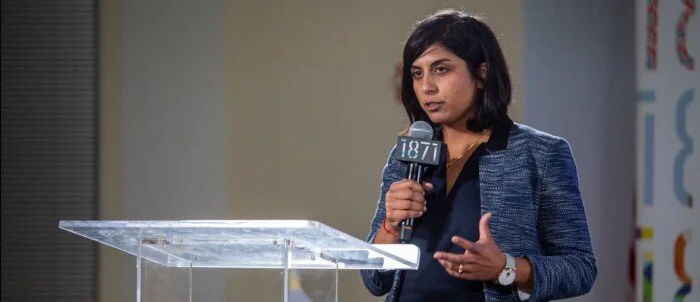By Roger Liew
This session was moderated by Jessica Droste Yagan, Impact Engine’s CEO, and the intention was to demonstrate how any company, through being intentional and positive in their business practices, can be impactful. Jessica’s own career has focused on the overlaps between making money and social good, and she used this experience to explore how three different organizations of very different scales apply process-based impact. The discussion illustrated that no matter the product or service of the organization, processes can be modified to produce benefits for society or the planet.
The basic question posed was “how do you find the win-wins where what’s better for the planet or better for society can be better for the bottom line?”. Our goal was to inspire, educate, and offer ideas anyone can apply in their workplace.
The three panelists were:
Steven Dyme, Co-Founder & CEO, Flowers for Dreams
The company, based in Chicago, offers floral bouquets where a portion of proceeds are donated. Thus far, $750k has been donated to 130 causes in the communities that they serve. An additional positive impact is introducing Flowers for Dreams customers to the beneficiaries, ultimately growing the following of their non-profit beneficiaries by 1.5x.
Jenny Farver, Co-CEO, 8th Light
8th Light is a consultancy which helps companies build software. Known for high quality work, the way they’ve built their workforce is by hiring primarily through an apprenticeship program. This hiring technique has produced a much more diverse workforce than is typical in the technology industry.
Jenny McColloch, Corporate Vice President of Sustainability, McDonald's Corporation
McDonald’s operates 40k restaurants across 140 countries, with a focus on feeding and fostering communities while maintaining both local and global perspectives. The sustainable sourcing team is most proud of their climate work, as McDonald’s is one of the first companies that set science-based targets to reduce greenhouse gas emissions. Their global scale has created a focus on the resiliency and strength of the global food supply chain.
Some key impact examples from our panelists included:
A focus on carbon management for grazing cattle has yielded improvements in the efficiency of raising beef.
Climate thinking is inherently long term, which has prepared the company to manage supply chain disruption.
Lower cost per hire via apprenticeship programs.
Diverse teams build better software because the users of software are diverse.
Differentiating between a “buy to give” model that’s tacked on versus integrating the giving program into the core product offering.
Other questions addressed included:
How do you deal with tensions between a social or environmental pressure and financial returns?
How do you engage your employees in the process of evaluating the company’s performance towards their impact goals?
How do you communicate your impact to customers?
How do you address the tensions between types of social impact, such as paying your employees more or lowering your prices?
The session closed by addressing the question of “can you be an impact company if your product or service is not solving a societal problem?,” which included concrete suggestions from the panelists:
Be authentic.
Iterate work in progress.
Be intentional and prioritize; don’t spread yourself thin.
Lastly, two book recommendations surfaced during this session:
Small Giants by Bo Burlingham, which is about companies that choose to be great by staying small.
Six New Rules of Business by Judy Samuelson, which includes ways to think about business holistically.
Missed this session or want to revisit the full discussion? Visit here for a full recording.





